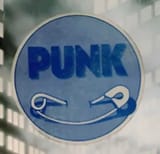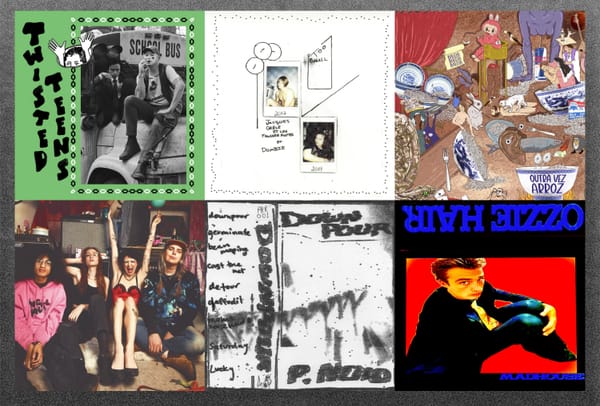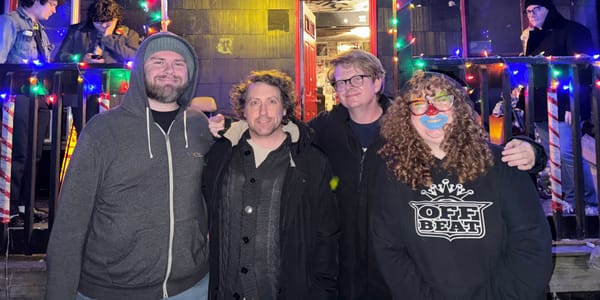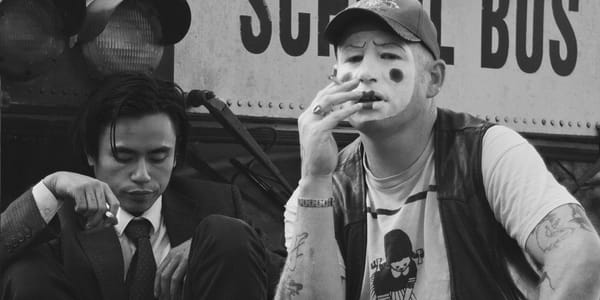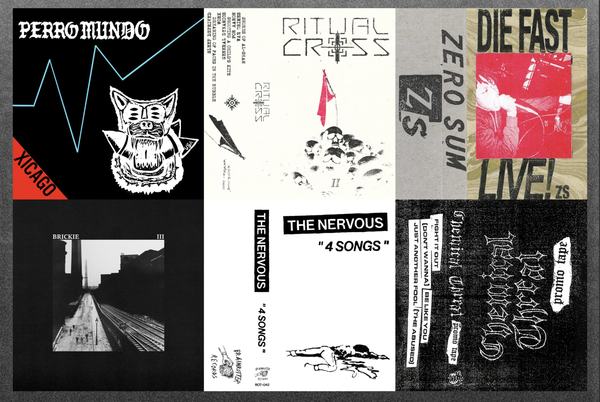added dimensions’ sarah everton reveals her added dimensions
The Richmond-via-Philly artist on her new album Jane From Preoccupied America and what she’s learned about running a band.

I always associated Sarah Everton with Philadelphia and her former band with musical and life partner, Rob Garcia. That project kept busy enough to change its name from Reading Rainbow to Bleeding Rainbow, expand their lineup from two to four members, and explore several sonically distinct eras; but always anchored by Everton’s penchant for punchy earworm melodies, and thoughtful lyrics. So I was stoked to learn that the couple had relocated to Richmond, Virginia (where Everton is originally from) and already played at least one show as Added Dimensions with Outer World’s Erin O’Hare on bass.
Everton and I met up on an idyllic afternoon in August at a picnic table in Libby Hill Park. We were up on the edge of Richmond’s Church Hill neighborhood where rolling hills lead your line of sight to a postcard-caliber view of the James River and the city’s expanding skyline overhead. Sure, the water way below runs a perennial crap brown and the Lucky Strike smokestack turned-luxury-lofts seem to mock their former factory workers who could never afford the rent (and even if they could, they wouldn’t be allowed to smoke inside). But it’s as close to paradise as you’ll find in this zip code. If only you could have seen the parade of cute-ass dogs strolling around the park while we talked.
Since those peak summer hours, soldiers have been sent to Washington D.C. with further threats—at the time of writing this—to dispatch to Chicago, Portland and Memphis. Added Dimensions’ new album Jane from Preoccupied America—released earlier this month on the Portland-based gem, Domestic Departure, is a fitting update to the Swell Maps’ allusion to WWII on the title to their roughshod post-punk masterpiece Jane From Occupied Europe.
Added Dimensions’ new one could be the last great album of the year, and at this rate, the whole damn empire as we know it. For their part, the band are a unique breed in Richmond and self-realized by their own make and design. Their sound is peerless, at the moment, but also at home on bills with a smattering of variously styled punk bands, including garage, psych, art, egg, synth pop, shoe-gazi and so on.
Did Added Dimensions start here in Richmond?
It started in the Charlottesville area. We briefly lived near there while Rob was a high school teacher for a minute. It turns out he hated being a teacher. He also chose a terrible time to do it.
I knew I was gonna start another thing, and I knew it was gonna be called Added Dimensions. I was super, super depressed also. And so it was great working on that. I was wanting to be able to be more prolific ’cause with Blow Dryer and other stuff, I always had a job that kept me from being creative and productive. I was always kind of recovering from working.
When was this?
2022 was when my self-titled tape came out.
When was Rob’s teaching gig?
It started in 2019 in Philly. And then he was co-teaching and then he did his first year in Philly, remote. And then we knew we wanted to move, but we weren’t sure if we were gonna move out of the Philly area. My brother lives in Charlottesville and he’s actually a teacher. I kind of had this feeling, I was like, Maybe we should move to Richmond. But when you’re not from Charlottesville, you’re like, It’s so pretty.
And at least it’s, like, liberal, even though it’s fucking neo-liberal hell. I love a lot of things about Charlottesville, but I also really hate it. We knew it was expensive, but the cost of living in Philly is at its worst. We thought it would probably be on par. But it was maybe worse. We had to live like 30 or 40 minutes outside the city. We lived in this beautiful area. It was like living at an Airbnb in the country, but all of our neighbors were old. And there were no sidewalks anywhere. You couldn’t go for a walk. There was no cell phone service and we were really cut off. Rob also got really depressed. We were both super depressed. It was bad. It was really bad.
Is Added Dimensions a solo project?
Basically, yeah, because I write everything. I demo everything out. The only thing I don’t write is the drum parts, ’cause I don’t give a shit about drums as long as they’re the right tempo and they’re not over the top. I like simple drum beats.
So I’ll have demos fully fleshed out, and then occasionally I’ll have a couple of songs where I’ll have notes like, Oh, I know I wanna make it longer, or, I want there to be an intro, or a guitar solo, or a single lead part. And then being able to record with Rob is perfect. He’ll be like, OK, just start. He’ll play back the tape and then I’ll start playing different parts over it. So he helps me process it in real time. He knows what I’m going for, and we know each other so well and I trust that his taste is always right. So it’s great. But yeah, I definitely feel really protective over it.
I’ve had bad experiences in the past with collaborating. I don’t think bands should ever be a democracy. Obviously, you can see I put my foot in my mouth all the time ’cause I make really declarative statements, but there’s huge exceptions. In my experience, it does not work. But it doesn’t mean you have to be a dick.
What are the other scenarios for band rule and order? Like have you been in bands that were total anarchy? Or a band that was a monarchy?
Basically there’s two different experiences. When you’re really young and don’t really have any experience and you’re just enthusiastic and excited, you’re like, Yeah, I wanna try everything. Like, Yeah, it’d be fun to try to record in a real studio. Or: It’d be cool to collaborate with other people. And you think, Oh, it’s bad to be a control freak. Oh, it’s bad to be the only one coming up with the parts—that you’re cutting yourself off to so much creativity by not collaborating. People have straight-up said that to me and Rob before.
I have to be able to process stuff long enough before I know how I really feel about something. I will have a gut feeling: This sucks. This is stupid. This is corny. And then it’s you against three or four other people and a producer, and you’re the one person, maybe the one woman, who has a problem. It’s very hard to be like, Hey, uh, I think that production you did is fucking corny as hell and I don’t like it. You’re just like, No, it’s fine. It’s fine.
Another band I was in, which I loved and it was great, was also the most undisciplined band. The whole vibe was: It’s just for fun. We started it that way to keep the stress down, but I’d try to nudge everybody into trying a little bit harder, you know? It never really worked. But it was still really fun. That was a good experience. That was closer to anarchy ’cause I was in charge. But I cannot be in charge. Even though I just said I’m in charge of Added Dimensions, it’s different. I don’t like telling people what to do.
How would you classify the band then as a social structure, or political system?
I was just talking about this earlier today. I wouldn’t say it’s a dictatorship. I actually think it’s easier to equate it to a really problematic small local business. Like a dysfunctional, toxic, small business, where everything that sounds like it should be bad is actually good.
Now I have to backtrack and figure out how to explain what I mean. ... OK, here’s a good example. So if you work at a local business and they do the whole shit where they’re like, “We’re a family,” and then you get really sick and you’re like, “I need to take time off. I’m so sick. I dunno what to do.” They’re like, “Yeah, I’m sorry. We’re gonna have to let you go.” And it’s like, I thought we were a family?
Now flip that around. If it’s a band, I can separate personal shit from band shit now that I’m older and have more experience. But basically if somebody in your band was chronically sick, you’d be like, “Hey, I wanna support you in any way possible. When you’re better, I want you to play with us again. But right now you can’t be in the band.” The band’s not gonna end or go on a break. You know what I mean?
The cool thing about a band is that you can still be a good friend and be that way. This is also why I could never have employees, ’cause I would not act like that if I was actually a boss. I would never be a boss.
So if Rob broke his hand...
Oh yeah. He couldn’t play. You find a different drummer, but then that’s why it’s not the perfect metaphor because it is so different. Rob would be like, “Of course you need to find someone to drum while I can’t do it.” When Erin started playing with us, I told her from the get-go: “You’re a really great bass player and I really like you a lot. That being said, when we record, it’s just gonna be me and Rob. And if there’s shows that we really need to play and you can’t do it, do you wanna get somebody that can fill in?” And she was totally cool with it.
It’s just a matter of being upfront at the beginning ’cause otherwise it’s easy to get your feelings hurt. A bunch of musicians are very sensitive. That’s why it’s so hard when you’re younger. You’re all sensitive and confused and don’t know how to take charge or communicate.
I first became aware of your music through Reading Rainbow and then Bleeding Rainbow. I know that probably had different eras, but in hindsight, how would you characterize your experience with those bands?
I can explain it in a hindsight type of way. Reading Rainbow should have just lasted for two albums and then stopped. And then we should have figured out something else. Because at that point I realized I did not like playing drums. I started because it was so visual. Rob could literally stand behind me and help show me the visual pattern of how to play the song. We collaborated on songs and stuff, but it was mostly him. And then he would straight up just tell me what drum parts to play.
I could jam in a Moe Tucker way. But I just wasn’t a good drummer and it couldn’t be sustained. I was really reluctant to switch to bass because it’s such a fucking trope where what happens is you’re the least experienced and you end up getting put on bass.
Ever since I was 13, I wanted to play guitar. I just needed to be able to play guitar so I couldn’t. And then, yeah, Bleeding Rainbow, I remember at the time we changed the name, I was like, It’s the same band. It’s the same band. No, it was a very, very, very different band. And I’m trying to think of ways to say things about it that aren’t throwing certain people under the bus, but I cringe a lot when I think about that band. I think that was the result of Rob and I being manipulated and losing control.
The way we each write songs—the way we write songs together—we need to be the ones to write the song. We don’t need a producer to be like, “Let me put this cheesy fucking laser effect over top of everything.” It made me feel not like myself. There were aspects of it that were great and I had a lot of fun at different times. Everybody that ever played with us in that band, I love them. Even if I haven't talked to some of them in a long time. Everybody’s a good person. That band was a fucking disaster though.

Now you have this solo project that’s been increasingly active and the batting average is sky high.
That’s why I have such intense control over it. OK, so being formulaic, that’s bad. But when you have a really good, basic formula that you build on and can still be innovative and creative, you need to stick to that formula. The formula is I write all the songs myself. I demo them out. I share them with Rob. We record them together. And that is it. It doesn’t get weird. And so I’m like, Why would I change this?
Are lyrics important to you?
Yes. The very first band I was ever in, it was actually also with Rob, the lyrics were so bad, but they were bad on purpose because we were so young and embarrassed by lyrics trying to be too sincere. Or like writing lyrics you think are good, but then you look back on and you’re embarrassed, or everybody else is cringing. So I was like, you know what? Let’s just write bad lyrics on purpose. I am the type of person where I can enjoy songs even if the lyrics aren’t good. I would prefer that they at least be buried so that they’re not distracting. I think people put so much time into the actual music writing that they’re like, God damn it, I have to write lyrics. So I incorporate it into the demo process so I don’t leave it to the very end. Plus it helps me with the structure of the song. I’m kind of shocked, I’ve come around to taking it very seriously. I have the same four or five themes running through all my shit.
What are your lyrical themes?
Neurodivergence and masking is a big one, and then a lot of shit will have more than one theme in there. One is definitely politics. A huge one that’s in all of them is being overwhelmed. I get overwhelmed by literally everything. Good and bad. I process stuff very slowly and which actually I think it’s because my brain goes too fast. So it’s counterintuitive. It’s like it moves so fast, it makes me process slowly. Another one is writing sarcastically from the perspective of the type of person I fucking hate, which is also what I’m terrified of being myself and what I’m afraid maybe I’m turning into or could turn into. I also have a song about what it must be like to not have mental illness, or anything different with your brain.
Which one?
“A Midtempo Mind.” It’s basically what it’d be like to not have anything going on, you know?
So, more sarcastic?
It’s genuinely curious. Like, Oh my god, are there people who don’t have brains that are always going crazy all the time? Like, What’s it like to not have mental illness? What’s it like to not have ADHD or OCD? I can’t even imagine. I know people that are like that, and they’re great, but I’m also just like, How do you feel about things? How do you emote? I don't even know. I’m having trouble even talking about it ’cause I just don’t understand. So it’s a little bit sarcastic ’cause I'm both jealous and I’m relieved that I’m not like that.
It’s a such a fine line between sarcasm and sincerity—they’re close cousins.
One of the best examples would be “Tell Me What to Do,” which isn’t on the album but is really sarcastic. It’s also really funny ’cause I love when people tell me what to do. Well, I do in certain contexts. I hate authority, but I also get indecision paralysis. “See-Through” is sarcastic. The verse is almost like the Democratic Party and then the chorus is the Republican Party. And I fucking hate both of them.
On your split cassette with Almond, which benefits the Transgender Law Center, each side has its own title. You don't see that often on splits. Your side is called “Uppers.” How linked are the themes of that material?
Because we were self-releasing it, we knew it had to be on a cassette. And I hated the idea of only having like two songs each. If we have the ability to have it be longer, it should be so. His side is almost 20 minutes and my side I think is a little bit longer than 15. It felt like, okay, well this is more than just like a split. We each have our own thing. I thought calling mine “Uppers” is funny because, his are all psychedelic and sludgy and then mine are fast and twitchy. Speedy. Like what drug was the person on who wrote this? Amphetamines, you know?
How’d you land on the album title?
Honestly, what happened was I wrote the song “Preoccupied,” and the thought popped in my head: Jane from Preoccupied Europe. I thought that was funny. And then I was like, Wait a second. I thought it was really stupid. Then the more I thought about it, the more I was like, Oh my god, no, that’s perfect. It feels exactly like what all the themes of the album are. The idea of people being overwhelmed and inundated by bad news and horrifying things. All the cliché shit of looking at your phones, being on the internet all the time. And then it also references the idea of a country being occupied, which it feels like that’s what’s happening. And then I love Swell Maps. So yeah, it just popped in my head.
How’d you link up with your label Domestic Departure?
I know Erica because she really liked Blow Dryer. Then I became familiar with Collate and they’re fucking awesome. We got to play together in Philly, like Blow Dryer did, and that’s when I met her in person. Then when I released my first tape, she ordered one and she included the message: “Hey, if you ever want me to release anything, like, let me know.” So I was like, “Hell yeah.” That’s how the 7" happened.
Then I didn’t realize she was considering winding the label down because of costs. I was unaware of that, so I approached her about doing a full-length album and she was like, “Hell yeah, I’ll do it.” I found out afterwards through mutual friends that she was thinking about folding and then I was like, “OK, do not feel like you have to do it. It’s totally fine.” But she insisted and said, “As long as Collate is a band, it’s gonna exist anyway.” It’s so great and so generous and awesome of her to release it because everything she releases is so good. She understands me. Like, I feel like we have a really good relationship and she gets my music so well without me having to explain it to her. It feels so good to be understood.
see/saw is a reader-supported publication. If you enjoyed this article, please share it and subscribe!

